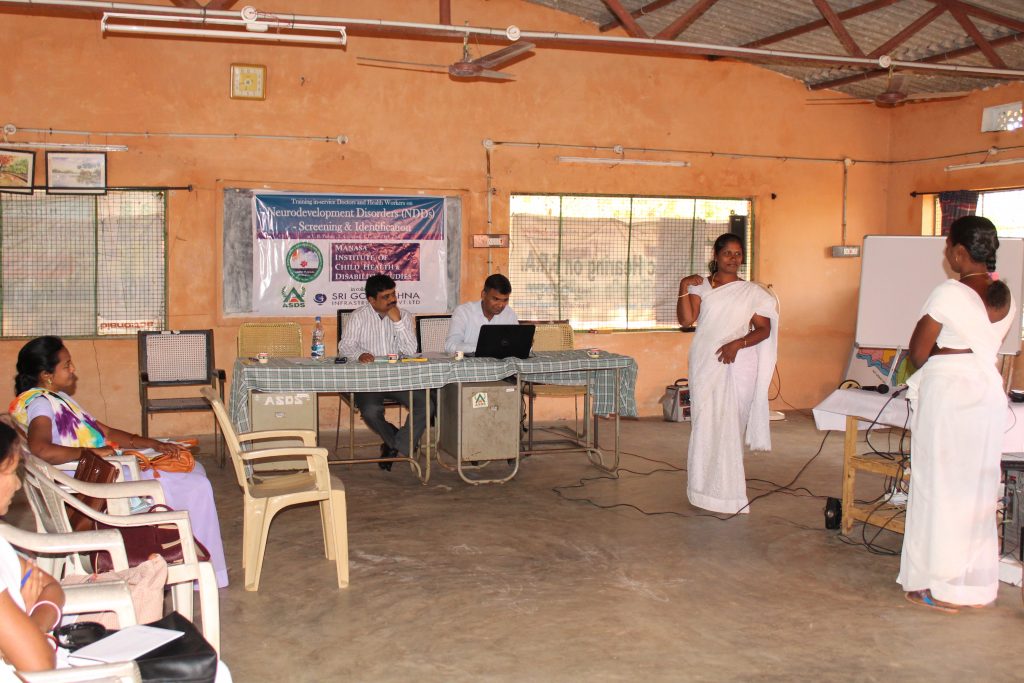Training in-service Doctors and Health Workers on Neuro Development Disorders (NDDs) - Screening & Identification at V. R. Puram, E. Godavari, A.P. on 08/02/2018.

| Time | Session | Speaker |
| 10.00 | Definition and Nature of NDDs & Aetiology.
|
Sri R. Ramakrishna Murthy
Director, MICHADS. |
| 12.00 | Screening and Identification of NDDs – Screening Tools and Methods
|
Shri B. Ravindra,
Rehabilitation Psychologist |
| 1.30 | LUNCH | |
| 2.00 | Differential Diagnosis of NDDs | Sri R. Ramakrishna Murthy
Director, MICHADS.
|
| 3.00 | Parental Counselling & Referral Services | Dr.JohnseyThomus,
Clinical Psychologist
|
| 4.30 | Clarifications & Feedback | __ |
| 5.00 | Vote of thanks &Valedictory | Sri Gandhibabu,
Member, AP State Commission for Protection of Child Rights
|
The ‘Manasa Institute of Child Health Disability Studies’ (MICHADS) Hyderabad promotes child health and rights, inclusion and empowerment of persons with disabilities and families through training, research and community services. As a part of the institute’s need based interventions this programme has been designed.
Neurodevelopmental disorders (NDD) are characterized by developmental deficits that usually show up early in a child’s development raging from mild to severe, mostly before the child enters elementary school, and can run throughout the individual’s lifetime. These neurological deficits can affect a person’s emotions, memory, and ability to learn, socialize,and maintain self-care, intelligence or overall social skills.There are many such disorders fall under this category like Intellectual Disability, Autism Spectrum Disorders, Speech and Language disorders and Hearing, and Vision Impairment, Attention Deficit Hyperactivity Disorder (ADHD), Learning Disability, Neuromuscular Disorders, Cerebral Palsy.Many times these disorder co-exist in individual.
Recent studies in India has revealed that from 10 percent (hilly areas), 13 percent (urban areas), to 18 percent (rural areas) of children ages 2-9 years were found to have one or more NDD1. The tribal prevalence was 4.96 percent, perhaps reflecting lower infant and child survival.
A national program for screening, diagnosis and treatment of NDDs was launched in 2013, the RashtriyaBalSwasthyaKaryakram (RBSK; National Child Health Program). The program is funded with more than $400 million, in order to develop 630 centers for screening and subsequent care of those found to have a neurodevelopmental disorder. Activities to achieve implementation are under way in many regions of India.
This is the need of the hour to gear up public health system to screen all the infants and children thoroughly for identification, parental /family counselling and referral services. The role of in-service doctors, ANMs and other health staff being very crucial in this process, this programme is relevant and contextual. The objectives of this programme are to to update on the recent advances in NDDs, foster knowledge and skills among the participants on screening and identification of NDDs and also on clinical counselling and referral services.
________________
Ref: 1. Donald Silberberg, MD, 2014, Neurodevelopmental Disorders in India: From Epidemiology to Public Policy- World
Neurology.






